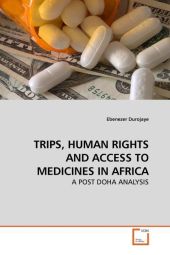 Neuerscheinungen 2010Stand: 2020-01-07 |
Schnellsuche
ISBN/Stichwort/Autor
|
Herderstraße 10
10625 Berlin
Tel.: 030 315 714 16
Fax 030 315 714 14
info@buchspektrum.de |

Ebenezer Durojaye
TRIPS, HUMAN RIGHTS AND ACCESS TO MEDICINES IN AFRICA
A POST DOHA ANALYSIS
2010. 128 S.
Verlag/Jahr: VDM VERLAG DR. MÜLLER 2010
ISBN: 3-639-24069-3 (3639240693)
Neue ISBN: 978-3-639-24069-6 (9783639240696)
Preis und Lieferzeit: Bitte klicken
The adoption by member states of the World Trade Organization (WTO) of the Agreement on Trade Related Aspects of the Intellectual Property Rights (TRIPS) in 1994 has remained controversial, especially with regard to its implications for life-saving medications in poor regions. TRIPS requires a minimum observance of patent protection for both product and process goods including pharmaceuticals worldwide. Thus, precipitating high cost of drugs and hindering access for people in Africa. However, the TRIPS Agreement contains useful exceptions which African countries can invoke to ensure access to medications for their citizens. Some of these exceptions include compulsory licensing, parallel imports and early working exception. In reality the use of these exceptions has proved very challenging for African countries partly due to opposition by developed countries and lack of expertise and/or capacity on the part of African countries. At the Doha Declaration by the Ministerial Council of WTO it was reiterated that member states of WTO have the right to invoke these exceptions, particularly compulsory licensing, without restrictions.
Ebenezer Durojaye is a researcher and doctoral candidate at the Department of Constitutional Law, University of the Free State South Africa. Currently his research interests include adolescents sexual and reproductive rights, access to medicines in Africa and the nexus between HIV/AIDS and gender inequality.


